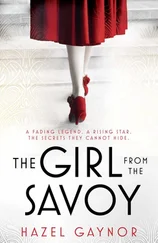“They’re both outside. You’ll be able to see them soon.”
The doctor came in, and he seemed nice enough, moving through many of the same questions. But I began to get this funny idea that my mother being kept in the waiting area was not the norm and was not an accident. This sense came to me not because the doctor asked me about Mom, but because he didn’t. Sooner or later, adults always ask about your mother or father. That’s the way it worked. Except with this doctor, and with Roman. They wanted me alone.
“How old are you?” the doctor asked. “I’ll explain what I am doing. I won’t hurt you.” I hadn’t thought he would… but then again, how would I know? I’d never had a gynecological exam before.
Next thing I know, I had my knees up and out and I was looking at his face in between my thighs, my feet trapped in those damn stirrups. But my muscles were relaxed— too relaxed for someone having an exam like this for the first time. Yet nobody questioned why my body was rubber; if they had, they might have tested for drugs.
The doctor looked inside me, I could feel his fingers through his rubber gloves, not poking but making small circles on the edges before probing deeper, asking me if he was hurting me. He seemed to be looking for something.
“Have you had sex before?”
“Yes.”
“How many times?”
Here it was again. The question. I had lied when Roman asked because I thought “once” would sound stupid. I told him twice. If I gave the doctor a different answer, he would find me out somehow, he’d realize I had told Roman one thing and him another, and then I would be the girl who lied.
“Twice,” I said. He frowned.
After he was finished and I got dressed, I was delivered back to the hallway and the officers who had come to the house. I stared at my feet. I had this sudden urge to laugh, and then was mortified that I might. What was wrong with me? This was not funny. But the Quaalude was still in my system, and all of the Quaalude looseness and euphoria as well. The doctor returned with more questions and his own clipboard, which he wrote on while nodding kindly. He spoke to the police and to my parents, not me.
At this point, something shifted. It’s still hard to say how or why. But we weren’t just a distraught family with a kid who’d been raped. If we were accusing some guy down the street, some appalling relative, we might have been more boring, but we’d be believable. In our case, though, we were naming one of the most famous movie directors in the world—and one who, less than ten years after the Tate murders, had a tremendous amount of sympathy in this one-industry town.
“They think we’re lying,” Mom whispered to Bob.
It was cold in the hospital. In the waiting room, my mother reached for me, but I could barely look at her. I clung instead to Bob. This, too, didn’t look good in the eyes of the staff, as I was later to find out.
Eventually, they gave Mom my release papers, and otherwise no definite instructions anyone could recall. Scanning the forms quickly, she caught what she thought was an error.
You have her down as “married,” she told the nurse.
“No, ma’am,” the nurse said, pointing to the line marked vaginal condition. My mother blinked. Vaginal condition: married?
“She’s thirteen. She’s obviously not married.”
The nurse said something about married being the word the hospital was encouraged to use to explain my “situation.” My mother didn’t get it. “But she’s thirteen,” she insisted. They called for the doctor, who repeated what the nurse had said, and my mother repeated what she had said to the nurse, only louder. The word remained.
You might think that someone might have wondered why I was such a zombie; a blood test might have revealed the presence of alcohol and Quaaludes. Nobody took my blood. Maybe they just assumed that of course I’d been drinking and gulping pills. I was just another screwed-up little skank.
• • •
We left the hospital and drove to the police station in Reseda. I was silent. Bob and Mom were discussing the innuendo they heard in the ER.
We sat in the waiting room. Police stations smell like coffee, sweat, and cigarettes, and everyone here seemed tired. I was moved to a small, cluttered office to sit by myself and wait. It had the standard-issue metal desk and two chairs. The door was closed behind me. On the bulletin board next to me was a report about a man who’d been beaten up and raped with a Coke bottle by two women. I read it twice before the detective came in and introduced himself.
Detective Philip Vannatter was tall and solid and had the face of a high school principal: deep-set eyes, large bushy eyebrows, a permanent expression of furrowed concern. He would later become nationally famous as the chief investigator in the O. J. Simpson murder case. But right now, he was just another smart and tough detective in the Los Angeles Police Department. Unlike everyone else we’d met thus far, he appeared not to have made up his mind about me or the circumstances. He was the first person who didn’t treat me like I was lying.
“I’m so sorry you have to go through this,” he said.
I let myself smile.
“When did you first meet Mr. Polanski?” he asked.
“About a month ago,” I said.
“Did he force you to go with him?”
“No.” It would have been hard to explain in an official setting like this how we met, how I wanted to be a model but didn’t really want to be photographed by him .
“What kind of pictures did he take of you?”
I told him about the photo shoot on the hill, and the shots at Jacqueline Bisset’s home, and the shots drinking champagne, and the shots by the lamp at Nicholson’s, and the shots in the Jacuzzi.
Did Mr. Polanski give you the champagne? Did he give you drugs? Do you understand what sex is? Did Mr. Polanski have sex with you?
I don’t think Detective Vannatter asked me if I had been forced to have sex. This point, I gathered, did not interest him much. He asked the questions calmly and did not rush me. He had a thin, kind smile. This time I wasn’t bothered that Mom and Bob had been directed to stay in the waiting area while I had been called away. For the first time all night no one was staring at me curiously, and I felt calm and safe.
I don’t recall Detective Vannatter taking notes, but he must have been. He surely had some kind of system, because in the same steady voice he repeated the questions, in the same tone, nodding thoughtfully again, like we were reshooting the scene.
I wasn’t undone by the repetition. I didn’t think he was trying to trap me. It was clear he just wanted my answers to be accurate. And since I was telling the truth, I felt no pressure to perform.
Still, there was this powerful sense that the train had left the station, and I was on the wrong goddamn train.
• • •
We slept little that night. In the morning, Mom, Bob, and I drove to Santa Monica, a beach town near where we’d lived in Pacific Palisades. We entered the Superior Court of California, a sprawling building rimmed by palm trees. They told me I had to talk to the district attorney. The whole thing had an air of secrecy about it. We didn’t even park out front; we had to drive to some underground garage. Maybe there was some perfectly logical reason, but it felt like the whole situation was hush-hush.
Soon we found ourselves in the office of Deputy District Attorney Michael J. Montagna, and staring at drab tiles that reminded me of the floors at school. Tired and just wanting to be cared for, I was acting like a baby. I sat on Mom’s lap for a time, then Bob’s. I was escorted alone to an office. There were at least two men standing, and a woman sat behind me.
Читать дальше












